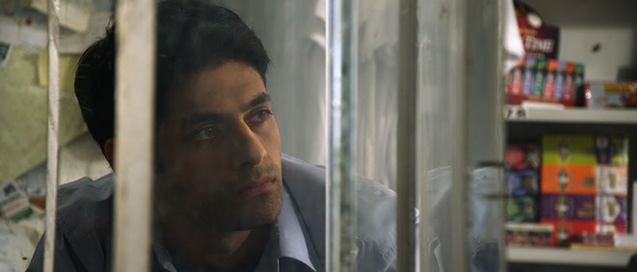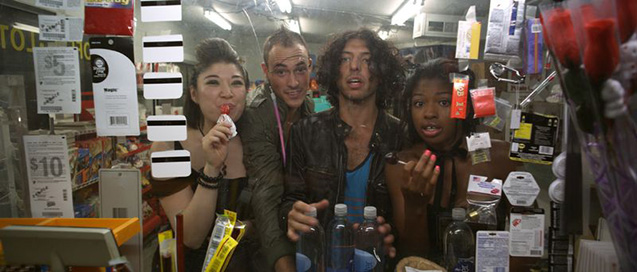
For those of us who’ve worked with Dearborn Michigan’s Arab American community during the past three decades, victories in this past week’s municipal elections were more than just big news. They represent vindication and confirmation of our belief in the strength and vitality of the Arab American community. After this election, the president of Dearborn’s City Council will be Arab American, Susan Dabaja, and, overall, four of the city’s eleven member City Council are now of Arab descent. Serving alongside Ms. Dabaja will be Michael Sareini (whose mother had been the first Arab American elected to the Dearborn council in 1989), Robert Abraham, and David Bazzy.
Just three decades ago, Dearborn was a different story.
 Najla (Nada Shouhayib) meeting Sami from behind the bulletproof glass. (Photo: Rola Nashef)
Najla (Nada Shouhayib) meeting Sami from behind the bulletproof glass. (Photo: Rola Nashef)
It was back in 1985 that a group of Arab Americans called me to come to Dearborn to help out. The Arab community, they said, was in shock. An individual running for Mayor in that year’s election had just sent a mailing to every household in the city which had spread across the front page the headline “Let’s Talk about… the Arab Problem”. Using inflammatory language the candidate’s mailing decried the large number of Arab Americans who were moving into the city. He described their “foreign ways”, “foreign language”, and “bad habits” saying that the presence of such a large number of Arabs was “threatening our neighborhoods, the value of our property, and our darned good way of life”. It was pure incitement using fear of the “Arabs” to scare the rest of Dearborn to support his candidacy.
I traveled to Dearborn in the midst of this crisis to help deal with the hurt, anger, and fear that the mayoral candidate had created among Arab Americans. On my first night there, I spoke to a large gathering at one of the community centers telling the assembled group that “we are not the ‘problem of Dearborn’, we are the promise of its future – and it is our responsibility to transform ourselves into that promise”.
 Sami (EJ Assi) works behind bulletproof glass. (Photo: Rola Nashef)
Sami (EJ Assi) works behind bulletproof glass. (Photo: Rola Nashef)
The next day, we secured Dearborn’s voting lists only to find that while Arab Americans numbered almost 19,000 of the city’s 90,000 residents – only 1,100 of these Arab Americans were registered to vote. In a perverse way, it appeared logical that the Arabs would become a convenient scapegoat for a crass and calculating politician – they were a huge presence, but because they weren’t voters they couldn’t help or hurt any candidate for elective office.
It was at that point that a collective effort began to empower the community so they would never be so vulnerable again. During the next decade we organized, registered voters, and mobilized community participation in politics. And since then, the progress has been substantial.
In 1988, mobilizing thousands of newly registered and energized Arab American voters, Jesse Jackson won the Michigan Democratic presidential caucuses. In 1989, Dearborn elected Suzanne Sareini – the first Arab American to serve on the City Council. She continued to win reelection, serving for two decades until her recent retirement.
 Customers in Sami’s (EJ Assi) gas station. (Photo: Rola Nashef)
Customers in Sami’s (EJ Assi) gas station. (Photo: Rola Nashef)
By 1996, when the number of Dearborn’s Arab American registered voters had increased to 8,000, the city’s Mayor (the same individual who had scapegoated the community in 1985) came to a political event sponsored by the Arab American Institute. He opened his remarks using a bit of Arabic, quoted the Qur’an, and referred to the community as “my dear brothers and sisters”. And a few years later, when Dearborn erupted in celebratory demonstrations following Israel’s withdrawal from south Lebanon, a leading participant in the demonstration was that same Mayor!
Today, Dearborn stands as a model success story for Arab Americans. Not only are they one-third the city’s population of almost 100,000, they are also one-third of its registered voters. Arab American businesspeople are the engine providing jobs and growth to the region. The Arab community has built massive social service institutions that serve the needs of tens of thousands of families – Arab and non-Arab alike. The city shares two Congressmen – both extraordinarily responsive to the full range of the community’s foreign and domestic policy concerns. And dozens of Arab Americans hold positions of prominence either as elected or appointed officials.
This election was special. With Arab Americans now holding four of the city council’s seven seats and with the president of the council now being a young smart Arab American woman, the community is well positioned to become the “promise of the city’s future”.
Press freedom is under attack
As Trump cracks down on political speech, independent media is increasingly necessary.
Truthout produces reporting you won’t see in the mainstream: journalism from the frontlines of global conflict, interviews with grassroots movement leaders, high-quality legal analysis and more.
Our work is possible thanks to reader support. Help Truthout catalyze change and social justice — make a tax-deductible monthly or one-time donation today.